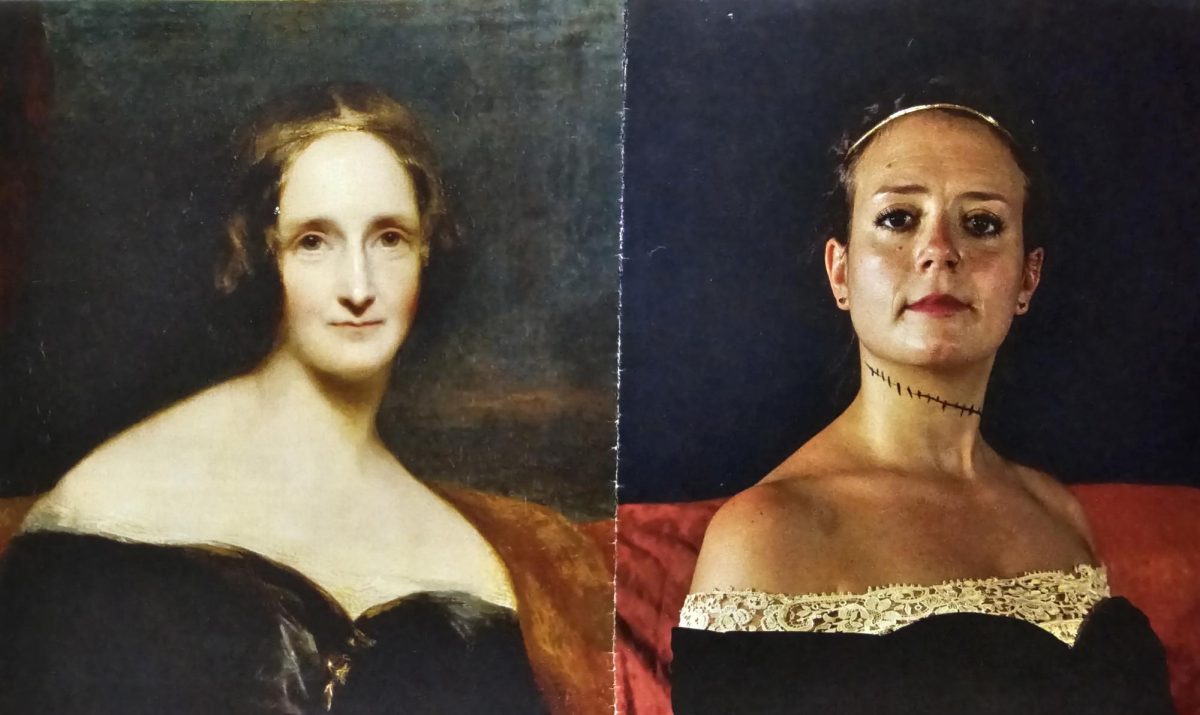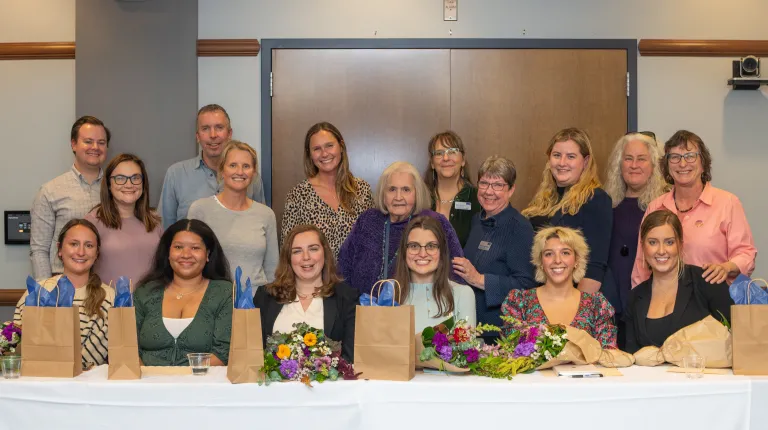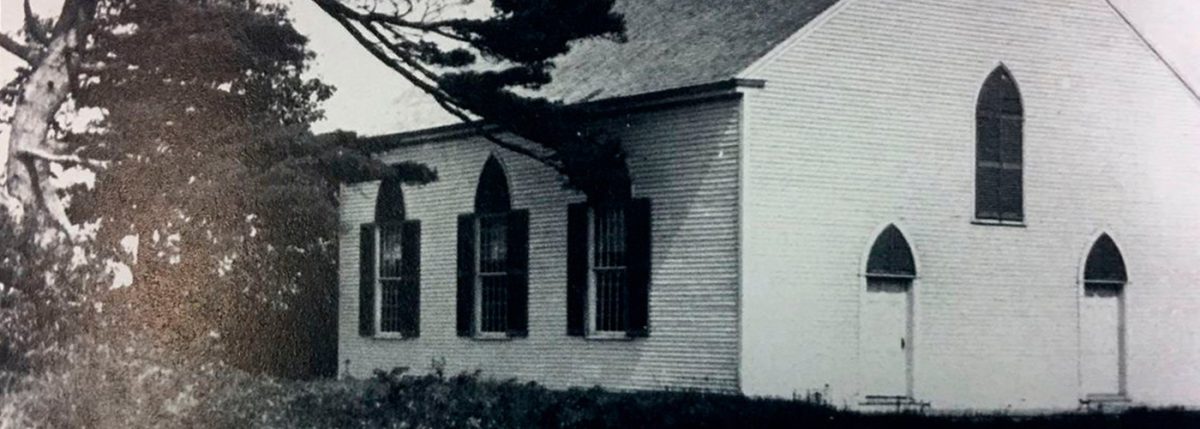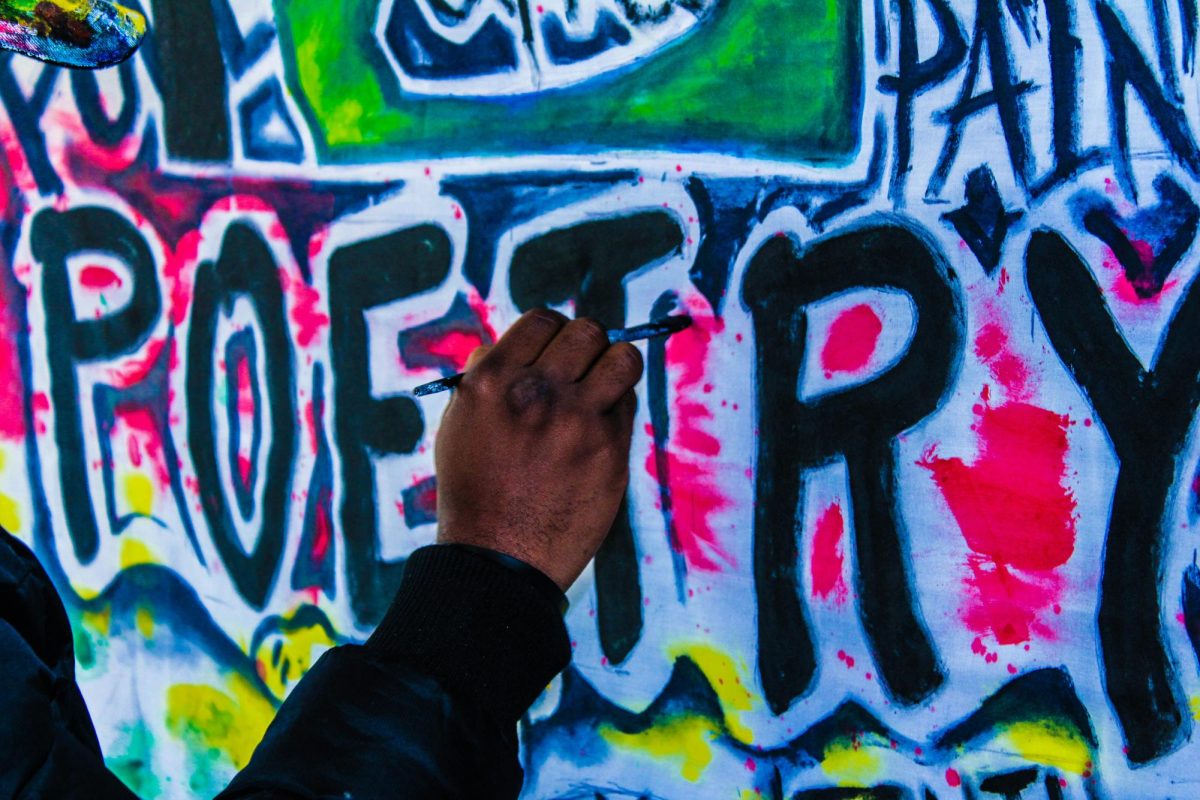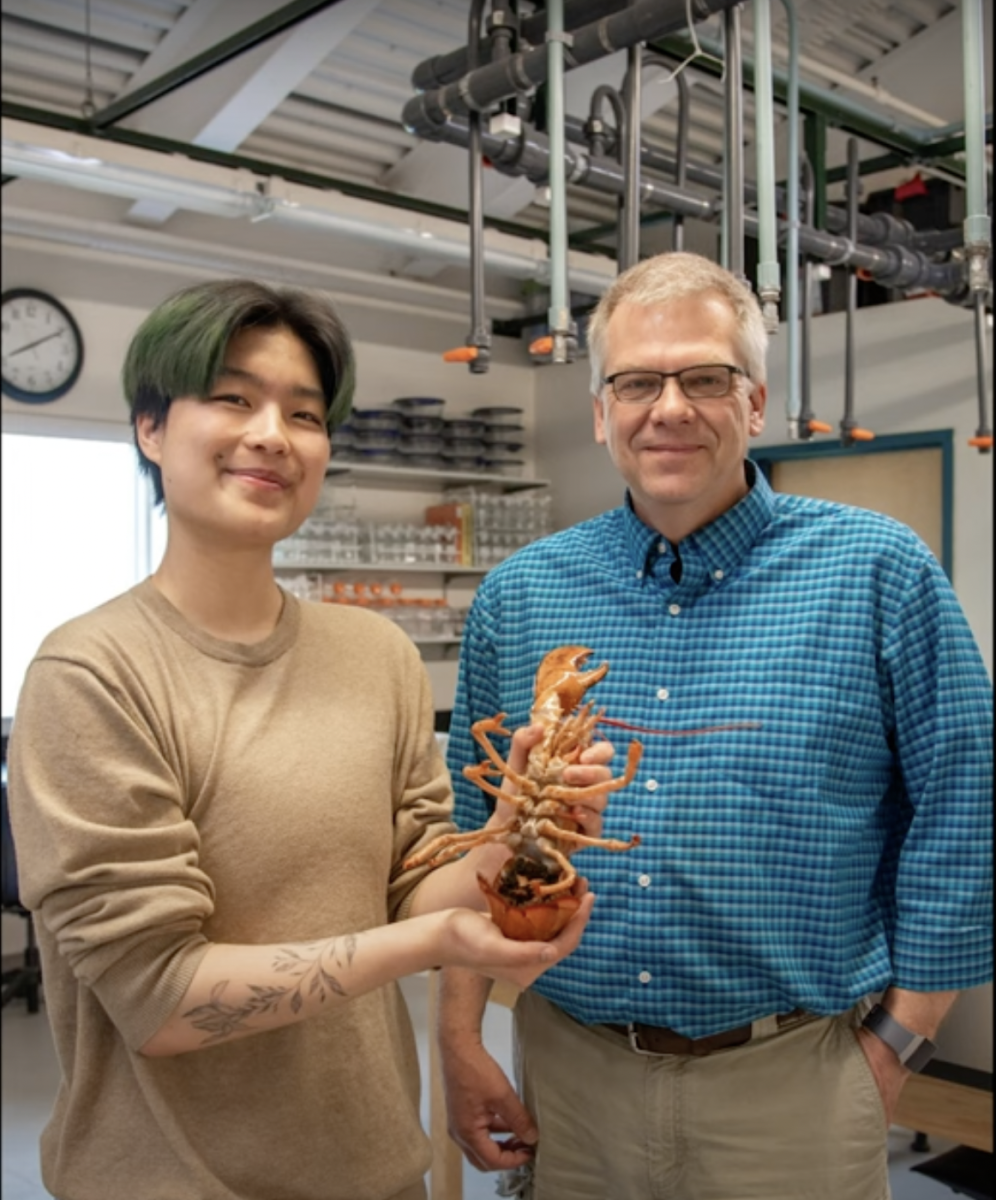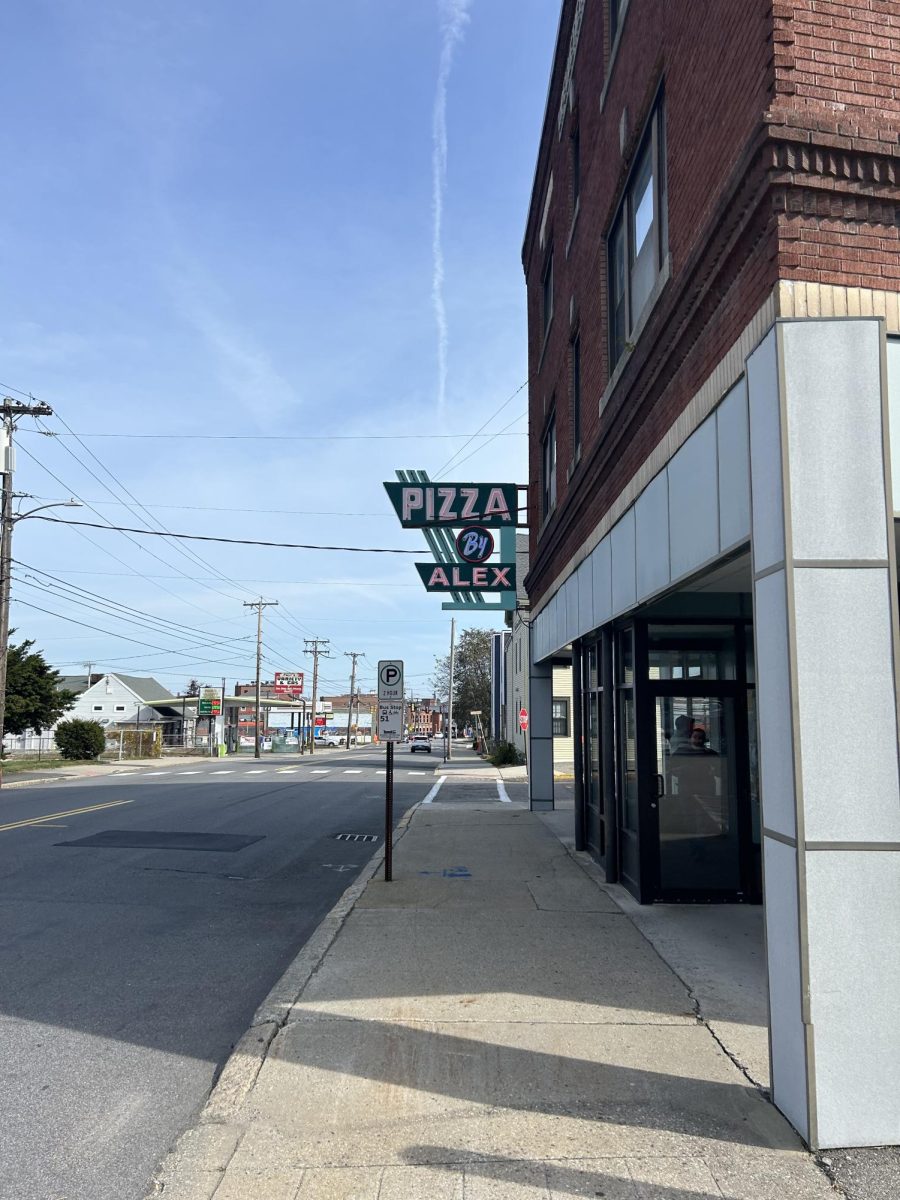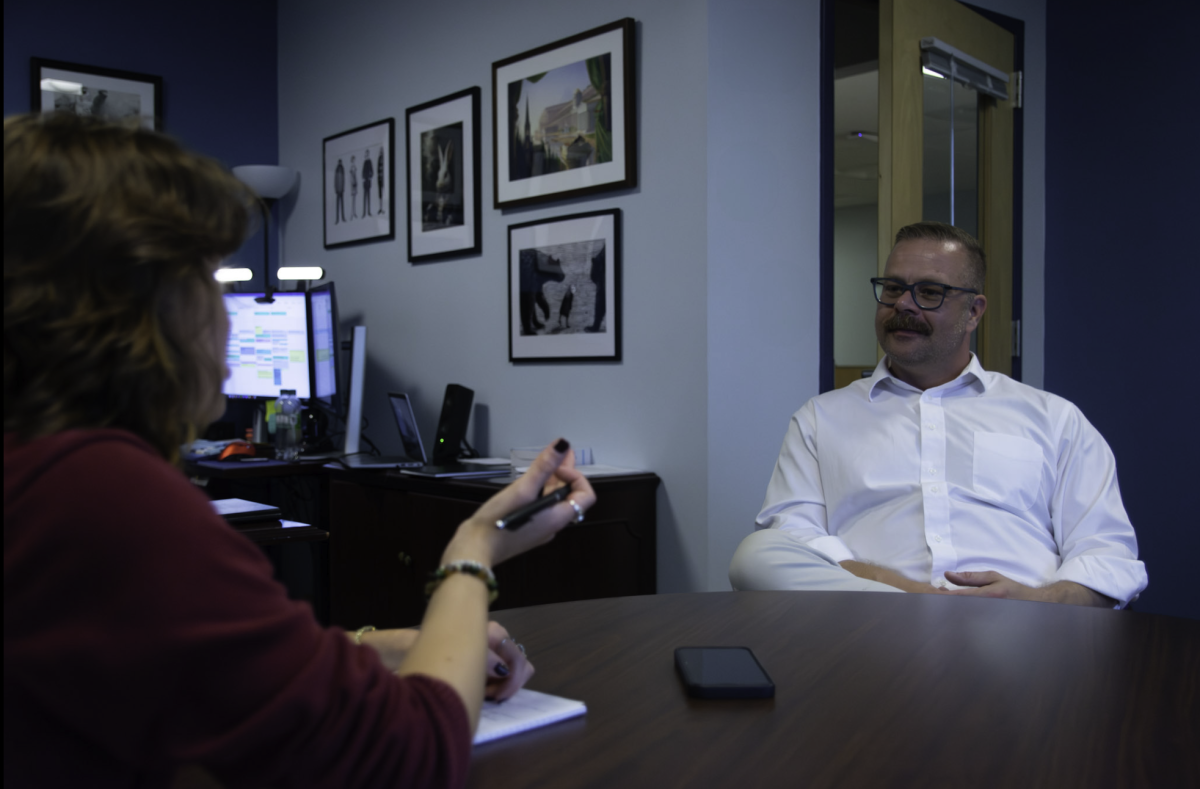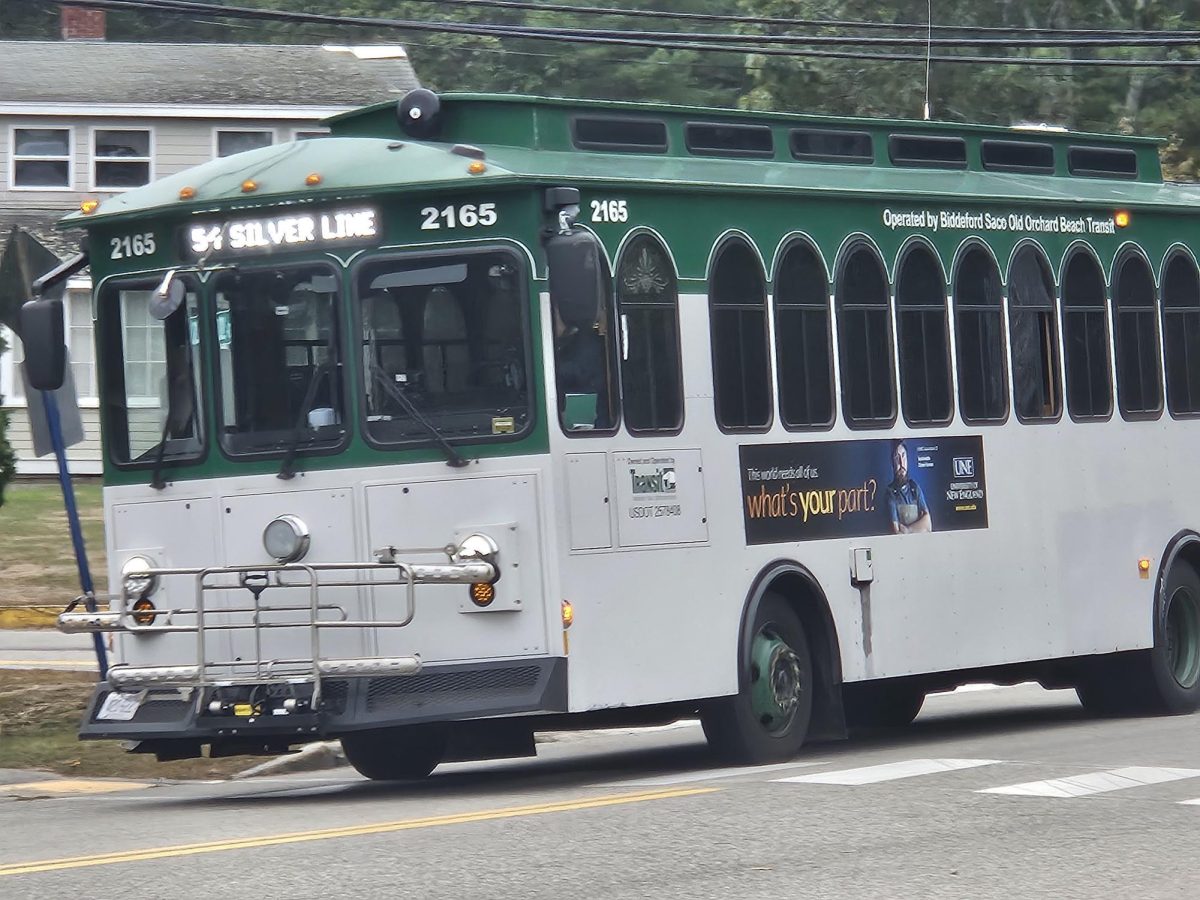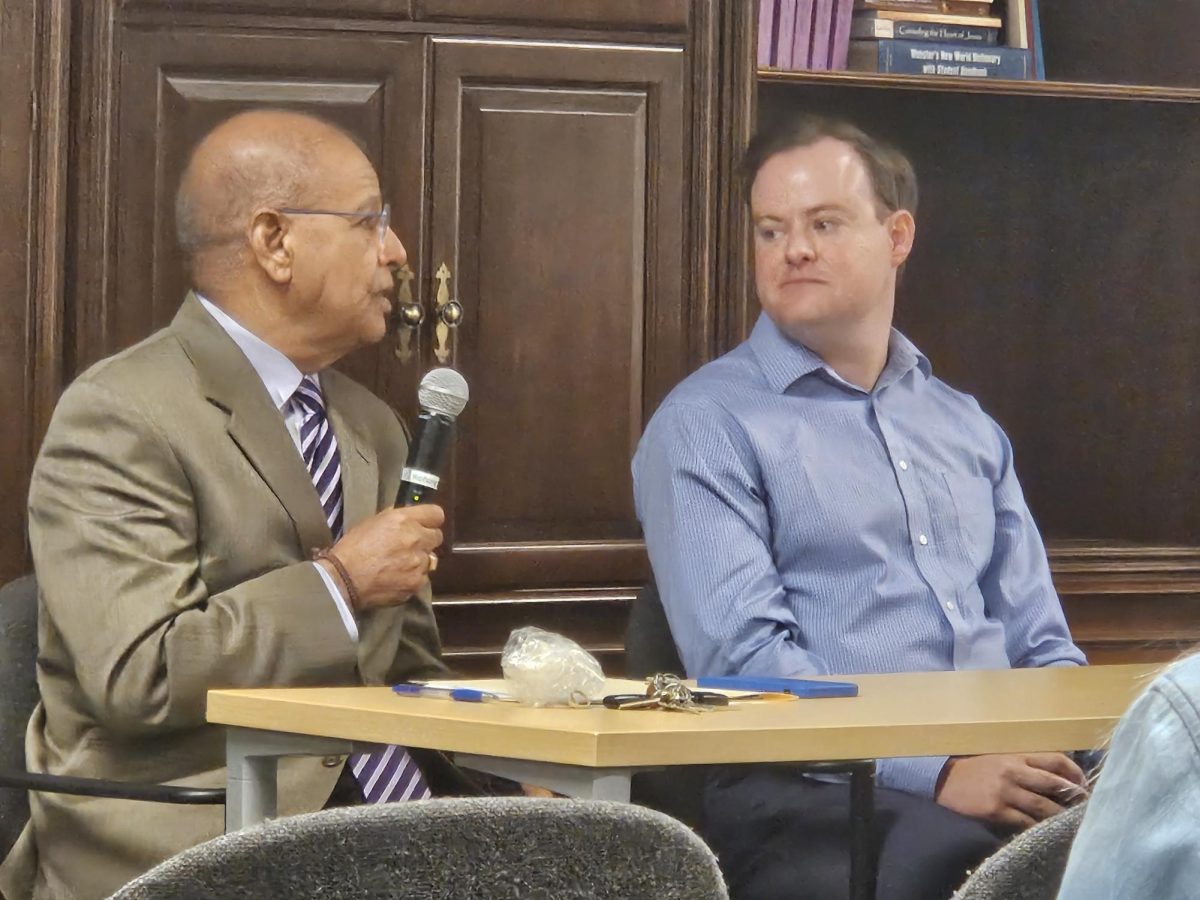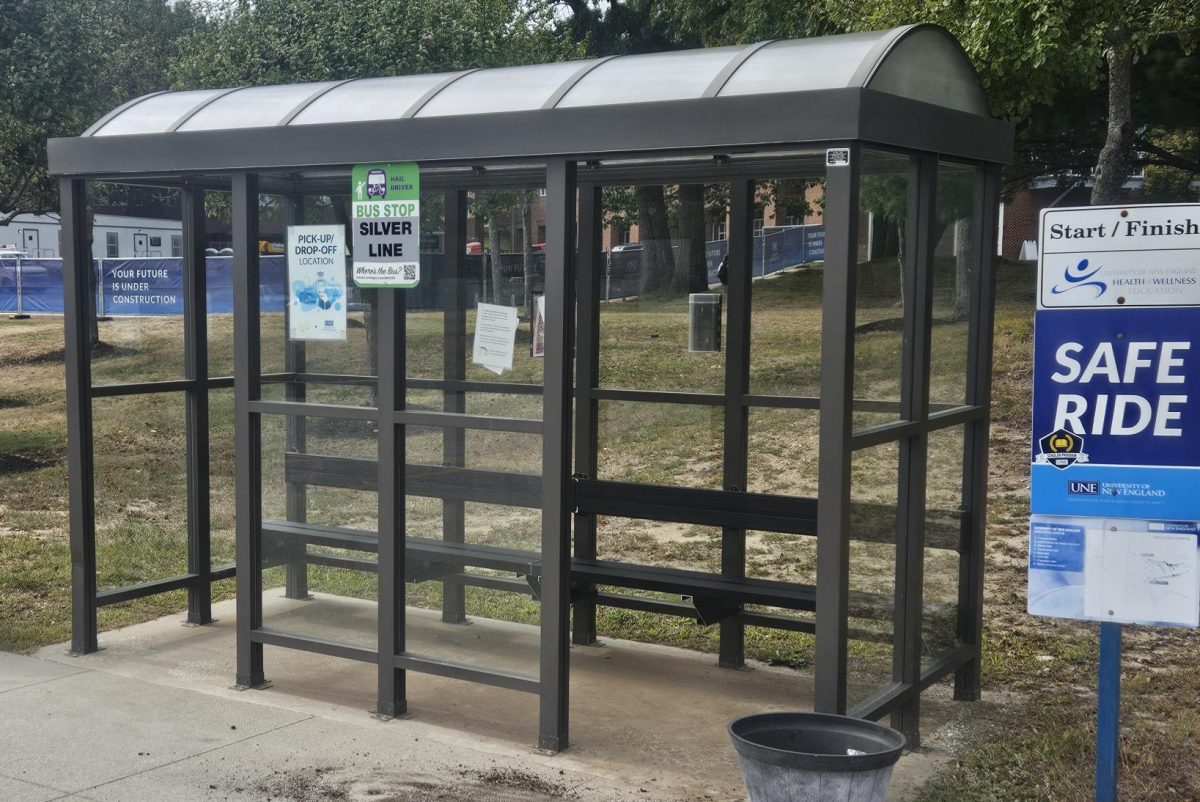Click Here to Listen:
Tempest is a student-run podcast that focuses on UNE’s School of Arts and Humanities on the Biddeford campus. Podcaster Chloe Boulle uses each episode to narrow in on topics including clubs, events, internship opportunities, extracurriculars, and the vibrant community that makes up UNE’s Biddeford campus.
Transcript (lightly edited for readability):
Chloe Boulle: Hello and welcome back to Tempest: A UNE Arts and Humanities Podcast. I’m Chloe Boulle, and for the first episode of season two of Tempest, I’ve decided to kick off the school year with a two part series about the play Anonymous: a tale of Mary Shelley. As some of you may remember, last year around this time, main playwright Kevin O’Leary brought his play Anonymous to UNE’s Biddeford campus. My friends and I got the chance to see the play together and really enjoyed it; but for those of you who didn’t get to see Anonymous, it is about Mary Shelley writing her masterpiece, Frankenstein.
Chloe Boulle: It was really interesting because in the play, Dr. Frankenstein’s monster, who was played by UNE’s own Professor Sean Ramey, comes to life… sort of- and the twist is that both Mary Shelley and her husband Percy can both see and hear him. Is he really there? Is he a metaphor? I thought we’d talk more about this and the plot of Anonymous in our next episode, because what I want to bring to you today is the conversation I had with the playwright Kevin O’Leary, or K.O. as he calls himself, that he was gracious enough to have with me last year.
Kevin O’Leary: Hi, everybody out in UNE world. My name is Kevin O’Leary and Chloe was kind enough to invite me back to campus a week after Anonymous closed here on campus to talk about the play, my work, et cetera et cetera. So we’re sitting here on a lovely bench. The clouds are coming in – we haven’t seen clouds for a couple of weeks now, so it’s unusual. We’ve had a dry spell of about 14 days. Maybe Anonymous had more influence on this campus than it imagined.
Chloe Boulle: So a little bit more about the play that you put on here,
Kevin O’Leary: Anonymous! Yes.
Chloe Boulle: Can you talk to me about the inspiration for this one?
Kevin O’Leary: Oh, that’s easy. I had a crush on a dead woman, Mary Shelley. I’ve always loved Frankenstein. I first came across it when I took a class with Stephen King at the University of Maine Orono when I was a freshman. This was in 77. He taught a course called Topics in Horror and the Supernatural. He was a guest lecturer at the time, and we studied Dracula, Frankenstein and two or three of his books- and I just- we all know of the legend of the story.
Kevin O’Leary: We all inadvertently make the mistake of calling the Creature Frankenstein, but that’s what we do. Frankenstein is Frankenstein. The Creature is the Creature. But it was the idea- and when I found out that Mary Shelley was a teenager when she wrote it, and when I started doing some more research I just became more in love with her- and then! In 2000— and I so I had the idea of writing a play about her on the back burner, but it went on to the front burner and I started chopping the vegetables, metaphorically speaking, when in January or February of 2018, the writer Jill Lepore, whose work I adore, wrote an article for the 200th anniversary of the publication of Frankenstein which was published, I believe, January 1, 1818. So she was asked by the New Yorker, of which she is a contributing writer, to write an article about Mary Shelley. And I read that article and I just went from back burner to front burner because I knew some of the facts that Jill Lepore talked about. But 95% of Mary Shelley’s life that she unfolded in that article, it just blew my mind!
Kevin O’Leary: So I wrote a note in the margin of the article, K.O. get to work. That year I think I had a first draft in a week- and then I dabbled with it and tweaked it and rewrote it. But basically I wrote what became the play that you saw here with very, very few changes quite quickly.
Kevin O’Leary: I always knew I wanted it to be a three-hander, a three character play. I always knew who the characters were that were going to be in the play. I always knew that the action was going to be in real time. Because I am a playwright who honors and tries as often as I am able to respect and obey the laws of Greek theater and the Greek idea of time, place and action. The unity of time, place and action, which we all learn about in our freshman college drama theater programs.
Kevin O’Leary: The Greeks believed that a well made play was a play that happened within 24 hours. Very few set changes. You know, one room would be ideal and it never really leaves that place. If you have to, there could be another place. But a really well made play for the Greeks was it happens in 24 hours, a few characters, and you stick with that main focal crucible laser beam- action.
Kevin O’Leary: So my play is, the Shelley play is, 75 minutes. It takes place in a real 75 minutes. When the lights come up, it’s 3:30 in the morning on a February morning in 1817, when Mary is putting the final touches on the last chapter of what would become the published work.
Kevin O’Leary: And I also tend to take a little bit of artistic liberty, as you saw last weekend, where my Creature in the play becomes this full blown entity that Mary has interactions with. And then it is revealed about halfway through the play that Percy also can see him, but doesn’t really talk about it. And he drops that bombshell in a scene where Mary is writing feverishly and then he reveals that.
Kevin O’Leary: So I always knew three, those were going to be my three characters. I always knew it was going to take place in real time. And when the curtain came down at the end, it was like 5:00 and the sun was rising for another day. So when I knew that was the model for the work I set about and I wrote it fairly quickly.
Kevin O’Leary: So that was the long winded answer to your very short question. What was the genesis and the impetus for writing the play? So I wrote it in 2018 and it had a world premiere last October in Portland with the same cast. So it’s the same cast as last October. The play was directed by Lauren Stockless and Jennifer London was our stage manager. So we, when we got the green light from UNE, we said we’d love to do it.
Chloe Boulle: It was absolutely wonderful. Like I said, I was so excited.
Kevin O’Leary: I’m always, I guess it’s the teacher in me, but my heart always has a special flutter flutter when young people walk in. And on Saturday night, which I believe was the show you were at, to see that 12 or 16, I’ll call them kids because at age 65, you guys are kids to me. You’re not kids, you’re young adults. But to see those young people walk in with all of their energy and excitement and then to talk to them after it was the real highlight for me of the whole weekend.
Chloe Boulle: Can you talk a little bit about like the process of putting it on at the school?
Kevin O’Leary: Sure. Here’s the good news. I had the entire set. I had all the costumes, I had all the props stored. So we were just waiting for the green light.
Kevin O’Leary: When I saw the space, I knew we were going to have to make some adjustments – and we did. There’s an opening into the play which is kind of a nightmare sequence after Mary gives birth that we had to cut because we just didn’t have the depth to pull it off. It would’ve meant having fifteen more feet upstage so the actors could be behind the three triptychs that my son painted- and then, we knew it couldn’t work, so we opted to lop the first five minutes of the play off knowing we weren’t going to compromise the integrity of the piece at all. We started the play with Mary waking up from a fevered dream, which really happens anyway- and I think it worked.
Kevin O’Leary: I saw the space, we knew what the complications were, I knew what we could do, and what we probably could not do, but we knew that we could pull off most of what we did in Portland. We didn’t have the lights that we had- it was beautifully lit in Portland- but we had the same soundtrack! The sounds that you guys heard were the same sounds, all stored. So making the leap from Portland to here was, I would say, 90% easy, 10% complex. But we got in here on Thursday night, we’ve solved the problems, and we were ready for an audience Friday.
Kevin O’Leary: Yeah, it was wonderful.
Chloe Boulle: Could you tell me a little bit about yourself and what you do?
Kevin O’Leary: Sure! Well, right now, my greatest part of my curriculum vitae is that I am a new grandfather. In fact, when I leave this interview, I’m going to pick up my grandson at daycare. So that is my greatest production, if you will.
Kevin O’Leary: But other than that, I am a retired high school English and theater teacher. I retired from Morse high school in 2022 after 22 years at Morse and six years in a private school in New York City.
Kevin O’Leary: My family, I moved my wife and our two kids back to Portland, Maine, where I was born and raised in July of 2000. We’ve been back now for 24 years. Both my wife and I are graduates of The New York University Tisch School of the Arts. That’s where we met. So I have been back in Maine, after leaving Maine for 20 years for 24 years.
Kevin O’Leary: I got the job at Morse in 2000. I did the after school drama program there for 22 years; and our claim to fame, if you will, here in the state was that when we went to the One-Act festival in March of every year, Morse High School, I believe, and I could be wrong, but I think I’m right. We were the only school in the state of Maine that every single year while I was at Morse for 22 years, brought an original student written play to the festival every March. There were other schools that did it often, but I don’t think any other school in the state of Maine did it for as long as I did it. I could be wrong. So we brought original plays every year. In fact, Marie Stewart Harmon, who just was in Anonymous here at UNE Biddeford campus, was one of my stars. I’ve known Marie since she was a freshman at Morse, and she did two of our plays in the One-Act festival.
Chloe Boulle: So you helped your students write the plays?
Kevin O’Leary: I did every year. I knew that when I got the job at Morse High School after coming from New York City, where I was a playwright and I belonged to a play-writing company called Writers group. There were six of us, there were three men and three women who got together every Friday night from 6 to 9pm for 10 years. Every single Friday night for a decade. We got together and we would bring in our material and we would give each other feedback on that material, and some of my plays came out of that experience. Flash forward, I moved to Maine. I was missing Writers Group intensely; and I asked my superintendent in 2000 if I brought professional playwrights up to Morse High School for a summer play-writing workshop, would the school fund that? And he was very enthusiastic about that. We soon as school ended in June. That following week we would mentor about anywhere from 25 to 35 high school students from around the state.
Kevin O’Leary: So we had about 15 kids from Morse, and then we had about three or four kids from six or seven other schools; and it was an intense week of Monday through Thursday writing and rewriting with suggestions from the writers. Then on Friday we would invite parents and guardians and each kid got 10 minutes of material- and it was lovely. It was called the Trigorin Project, so named after the character in the Chekhov play who famously quipped during the play, “I must write, I must write, I must write” and that was our very first t-shirt. It said, “I must write, I must write, I must write” and we did that for six years, until the summer of 2006 when I started my own theater company called Lanyard Theater Company in Bath and our claim to fame with Lanyard was that we only did original plays written by Writers Group.
Chloe Boulle: Fantastic.
Kevin O’Leary: Yeah! So it’s been a very busy 24 years teaching.
Chloe Boulle: Sounds like it.
Kevin O’Leary: Writing, doing a little acting in the Portland community, retiring two years ago, being a grandfather, and now having this experience at UNE, which we hope, Professor Ramey and I are hoping, that this continues so that we want to see if UNE liked us. We loved our experience here and we hope that this is just the beginning of something that builds to be something else.
Kevin O’Leary: Okay! Is there anything else you need from me?
Chloe Boulle: Um, no. If you have no final thoughts- you’ve given me some absolutely fantastic material!
Kevin O’Leary: Well, I’m proud of you kids! The way that you came and asked questions and your enthusiasm and- we’ll come back! We would be honored to come back whenever you wanted us. All right. Thank you, Chloe.
Chloe Boulle: Thank you so much.
Kevin O’Leary: All right.
Chloe Boulle: I really appreciate it.
Kevin O’Leary: My pleasure. So good luck to all of you here on the UNE Biddeford campus. Study hard. Kevin O’Leary, playwright, signing off.
Chloe Boulle: Thank you so much to Kevin O’Leary for talking with us today, and thank you for listening. I hope you’ll join us in our next episode where we’ll be visiting the play Anonymous, hearing from students, and chatting with Professor Ramey about his part in the play. This has been Chloe Boulle for Tempest.
The music in today’s podcast was Summer Fun Pop by Music for Creators taken from Free Music Archive.



